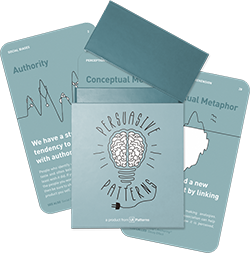Hedonic Adaptation
Design Pattern
Alternate titles: Hedonic Treadmill.
Problem summary
We return to a stable level of happiness despite major positive or negative events
Usage
- Use to maximize the duration of user happiness
- Use to gradually release products or content to users to let it function like a anticipated reward.
This card is part of the Persuasive Patterns printed card deck
The Persuasive Patterns Card Deck is a collection of 60 design patterns driven by psychology, presented in a manner easily referenced and used as a brainstorming tool.
Get your deck!Solution
- Slow it down by breaking it up. Slow down the fading process by breaking up the experience into smaller bits. Think of ways to keep users in a state of permanent and slight hunger; they will love you for it. Being asked, they will say that they want it all at the same time.
- Too much good. Our expectations and desires rise in tandem to the levels of good or bad we are experiencing. Receiving a pay rise provide immediate happiness, but the feeling quickly fades as we get accustomed to it. Consider how you can keep users in state of permanent slight craving to keep expectations low and users happy.
- Maximize the duration of happiness. What users think they want is not what will make them happy. Build anticipation and positive hype by gradually releasing products or content to users. By limiting access, each release will function as a much anticipated reward.
Rationale
No matter how good or bad a new experience makes us feel, our feelings eventually revert back to normal, shifting adaption levels to the new baseline. Lottery winners are no happier than non-winners eighteen months later. Restricting pleasure increases the feeling of pleasure.
Social & positive psychologists, Philip Brickman and Donald Thomas Campbell, coined term Hedonic Treadmill in their 1971 seminal article, which refers to the concept of Hedonic Adaption. The concept of habituation to new circumstances is surprisingly consistant with Herzberg’s 1966 two-factor motivation-hygiene theory, although heavily debated and disregarded.
1 Brickman; Campbell (1971). Hedonic relativism and planning the good society. New York: Academic Press. pp. 287–302. in M. H. Apley, ed., Adaptation Level Theory: A Symposium, New York: Academic Press
2 Leif & Meyvis (2009). Enhancing the Television-Viewing Experience Through Commercial Interruptions, Journal of Consumer Research, Volume 36, Issue 2, Pages 160–172
3 Herzberg, F.I. (1966). Work and nature of man. New York: Thomas Y. Crowell.
4 Hedonic Treadmill at Wikipedia.org
5 Hedonic Adaptation at Coglode.com
6 Hedonic Adaptation at Learning Loop
User Interface Design Patterns
- Forms
- Explaining the process
- Community driven
- Tabs
- Jumping in hierarchy
- Menus
- Content
- Gestures
- Tables
- Formatting data
- Images
- Search
- Reputation
- Social interactions
- Shopping
- Increasing frequency
- Guidance
- Registration
Persuasive Design Patterns
- Loss Aversion
- Other cognitive biases
- Scarcity
- Gameplay design
- Fundamentals of rewards
- Gameplay rewards
